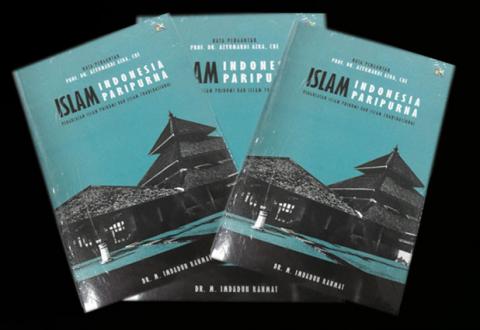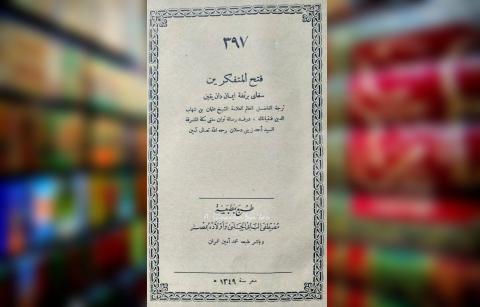Writer : As'ad Said Ali
Introduction : KH Mustofa Bisri
Publisher : LP3ES Jakarta
Edition : I, February 2009
Volume : 340 pages + xxxii
Reviewer : A. Khoirul Anam
Since the reform rhythm sung, some of the nation's elements have remained traumatic with Pancasila because of the fact that during the New Order era, it as if belonged only to the ruling regime. People were forbidden from interpreting Pancasila. School students were obliged to participate in the national program so-called the Guidelines for Understanding and Carrying out the Principles of Pancasila (P4) as the only way to interpret it. All mass organizations as well as political parties had to declare Pancasila as the only acceptable ideology instead of being capable of explaining many things in regard with the ideology. Even it was used as a means to prevent critical individuals from speaking and advocating their ideas; those who were different from and opposed to the government were regarded as non-Pancasilaists.<>
Pancasila has now been returned to Indonesian people. On the one hand there have been some national elements still awkward to take their own belonging and on the other hand there have been some greatly appreciating Pancasila as such inner power able to awaken the nation from difficult circumstances. Hence, in any situation there have been no any capable of not taking into account of Pancasila that means 1) belief in the one and only God; 2) just and civilized humanity; 3) the unity of Indonesia, 4) democracy guided by the inner wisdom in the unanimity arising out of deliberations amongst representatives, and 5) social justice for the whole of the people of Indonesia. These five principles are also mentioned in the Opening of the 1945 Constitution.
The "Negara Pancasila: Jalan Kemaslahatan Berbangsa" written by As'ad Said Ali seems to show the fact that in whatever condition, there have been no such national elements capable of escaping Pancasila from Indonesia instead of having willingness. For putting aside Pancasila also means destroying the Unitary State of the Republic of Indonesia (NKRI).
Pancasila is a powerful foundation for a big nation having a large number of ethnic groups, religions, thousands of islands and bestowed with abundant natural resources. In this regard, As'ad names Pancasila as a meeting point (nuqthotul liqo') as a result of a common awareness especially during the time of crisis. The awareness has emerged from the readiness to struggle for addressing greater interests in at least forming a big nation. Pancasila constitutes a basic consensus that becomes a key element in establishing the nation.
Pancasila has become a meeting point especially as facing fierce debates in dealing with the state's ideology; between those expecting Indonesia to be a secular state and those expecting it as a religious one for considering that Indonesia is a predominantly Muslim country. Islamic figures have wholeheartedly accepted a reality that Indonesia has not only recognized one religion or faith. KH Wahid Hasyim, chairman of the Central Board of Nahdlatul Ulama (PBNU) taking part in the the Investigating Committee for Preparatory Work for Indonesian Independence (BPUPKI) meeting, for instance, fully supported Pancasila as the state's ideology and even tolerated the modification of its first pillar, saying the Lordship with the obligations to carry out Islamic law to its adherents to be the Oneness Lordship.
The 340-page book written by the deputy chief of the State Intelligence Agency (BIN) is brilliantly able to show a tense, emotional, touching situation during the process of formulating the state's ideology. Religious matters were later settled in an imaginative "the Oneness Lordship" formulation of the first principle of Pancasila. Islamic figures successfully assured Muslims that Islam is broader than a mere state. Pancasila should not be forbidden because of the principle of Islamic jurisprudence, al-ashlu fil assya' al-ibahah hatta yadulla ad-dalil alaat-tahrim (the default status of things is indifference until the proof indicates prohibition)". The ulema also brilliantly gave public a good, clear understanding that Indonesia is rightfully characterized as a religious state rather Islamic state. It is the state of Pancasila basing itself more on Islamic teachings.
As the New Order unilaterally imposed the interpretation of Pancasila and compelled it as an ideology, the ulema declared their "OK". In a national ulema meeting in Situbondo on 21 December 1983, the NU leaders successfully formulated a declaration in regard with the relationship between Pancasila and Islam:
"1. Pancasila as foundation and ideology of the state of Republic of Indonesia is not religion, can not replace it and can not be used to replace its position; 2. The pillar of "Belief in the One and only God" is the ideology of the state of Republic of Indonesia in accordance with the chapter 29 article 1 of the 1945 Constitution, inspiring other pillars, reflecting tauhid in accordance with the belief in Islam; 3. For Nahdlatul Ulama (NU) Islam is the creed and syaria, covering the aspect of the relationship between humans and God and the relationship among fellows; 4. The acceptance and the implementation of Pancasila is the realization of such effort of Indonesian Muslims to carry out their religious sharia; 5. As the condition of its stance, NU is obliged to secure rightful understanding about Pancasila and its pure and consistent implementation by all parties."
The acceptance of Pancasila as the only ideology in reference to the 5th point of the declaration is the political effort of ulema in order not to be (mis)used by the government willing to regard Pancasila as its own belonging.
In further, the book sounds optimistic and even its writer says that Pancasila has inspired other nations to address their constitutional basic problems related especially to religion. In 1924 Turkey was not in harmony with the Islamic sultanate and, instead, struggled for being the first secular nation ever in the Islamic world. While in South Asia, Pakistan which was in the region ruled by the Mogul dynasty later declared itself as Islamic state. At this point, there were two mainstreams competing to achieve independence between Ali Jinnah as the representation of a secular state and Maududi representing the development of religious state. Eventually Pakistan tended to be an Islamic state following its failure to unite the two powers in such a win-win solution to meet a modern state's ideology.
Pancasila is indeed littered with indigenous values especially since the debate has come into being whether Indonesia should be made as an advanced nation as that in the West or making Indonesia as a socialist or capitalist one. The historical experiences indicate that holding firmly on our own cultural values is the source of power. The writer appoints such countries capable of showing their power as Japan, Korea, China and India.
At this point Pancasila is not an amulet although its values are explored from within Indonesia. As the state's ideology that can stand equally with other world's great ideologies, Pancasila is an open ideology. Its interpretation can not be single as that ever practiced during the New Order era with its P-4. In this case, Indonesian people deserve to interpret Pancasila as long as their interpretation is not opposed to the principles of Pancasila.
As'ad Ali in his book published by the LP3ES also criticizes several far-reaching interpretations in the reform era. For instance, some materials in the amendment of the 1945 Constitution were solely conducted as reaction of the reform warriors' disappointment toward the New Order regime. There are many produced by the New Order have been changed in such a way. As a result, the democracy formulated seemed to be meaningless, complicated, very theoritical and did not improve the concept of the Pancasila democracy having since the beginning been initiated. As'ad says the change has yet to give such positive impacts especially in making Indonesian people live in prosperity.
The similar far-reaching errors had also occurred before the New Order era. As'ad says the "Konsep Ekonomi Pasar Terkelola" which was formulated by the economic bureaucrats grouped under the Ikatan Sarjana Ekonomi Indonesia (ISEI) as instructed by President Soeharto did not take into account of the importance of cooperation as mandated by the 1945 Constitution and by the nation's founders, considering the cooperation as the main pillar of the nation's economy. There have been many that should be corrected.
Finally, the book "Negara Pancasila: Jalan Kemaslahatan Berbangsa" is very important to read. It can throughly and carefully explain the relationship between the decision makers and the influential ideologies that have widely reached and been very dominant in every corner of the world. It is once again able to elaborate any fierce battle in formulating policies from time to time or in interpreting Pancasila. It is also very interesting to read especially for Muslims as a majority in the country. Not only does it sketch out many things related to the wrestling between the state and religion in which the two are later met in a point called as Pancasila, but it is also written with specific terms having popularly been recognized by pesantren community. As if the writer is high demand that Pancasila should be the spirit in realizing a prosperous Indonesia.
The reviewer is journalist at NU Online
Terpopuler
1
Khutbah Jumat: Ramadhan dan Kesempatan yang Tidak Selalu Terulang
2
Keluar Mani yang Tidak dan Membatalkan Puasa
3
Khutbah Jumat: Ramadhan, Melatih Sabar, Memperkuat Syukur
4
Khutbah Jumat: Tiga Kebahagiaan Orang Puasa
5
Kultum Ramadhan: Keutamaan Tarawih dan Witir
6
Khutbah Jumat: 4 Cara Menghidupkan Malam Ramadhan dengan Ibadah
Terkini
Lihat Semua















